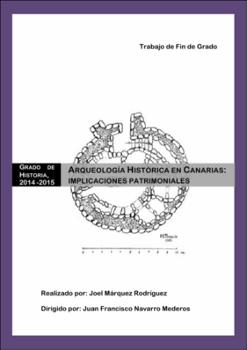Arqueología histórica en Canarias: implicaciones patrimoniales
Author
Márquez Rodríguez, JoelDate
2015Abstract
La arqueología histórica, que estudia los restos arqueológicos coetáneos o
posteriores a la Baja Edad Media, se desarrolla en Canarias desde hace varias
décadas. Esta trayectoria ha evolucionado de manera fluctuante al estar condicionada
por sus peculiares características, avatares económicos, sociales, académicos y
políticos. Su análisis se ha centrado, principalmente, en tres ámbitos que parten de la
organización espacial y de la función socioeconómica y cultural de los yacimientos:
recintos de tipo religioso, militar o civil, y espacios abiertos. Indagar en su gestión
posterior resulta fundamental para comprender, por medio del vínculo entre la
ciudadanía y los bienes arqueológicos históricos, cómo se concibe y se recibe este
tipo de patrimonio por parte de la sociedad, y cómo influye esto en el estado de la
investigación y en el usufructo del mismo. Historical archaeology, which studies the contemporary and subsequent to the
late Middle Ages archaeological remains, takes place in the Canary Islands for
decades. This trend has evolved fluctuating way, conditioned by its peculiar
characteristics, economic, social political changes, academic and. Its analysis focused
mainly on three areas that are based on the spatial organization and socio-economic
and cultural role of the deposits: enclosures religious, military or civil, and open spaces.
Investigate its subsequent management is critical to understand, through the link
between citizenship and historic archaeological, how is conceived and this heritage is
received by the society, and how this influences the state of research and the
enjoyment of it.




